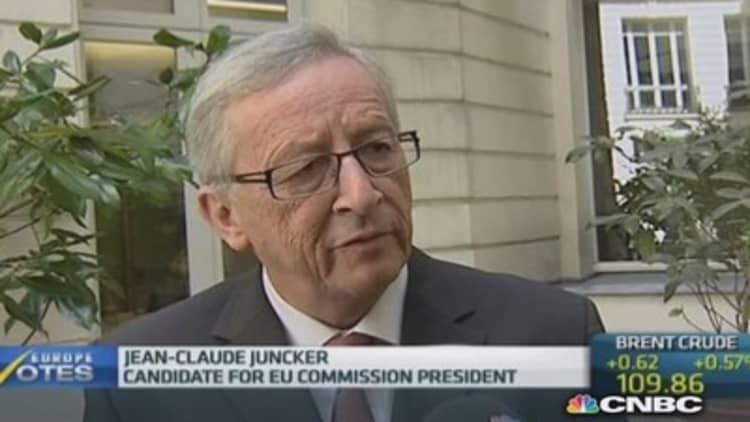Next week's European elections will not only see new members of the European Parliament (MEPs) appointed, the vote will also determine who becomes the next President of the European Commission.
The position of head of the European Union's executive arm is one that remains a mystery to many, but it remains crucial to the future of the EU.
"The Commission President has a big say in the strategy of the European Commission as a whole," Guntram Wolff, director of the European think tank Bruegel, told CNBC in a phone interview. "(They) have a say in what kinds of legislative proposals make it to the table."
Not only does the President play a critical internal role, they also have influence over foreign policy by representing Europe at meetings such as the G8.
And this year, the stakes are even higher for wannabe Commission presidents. Usually, the president is simply nominated by EU member states – but this year, for the first time, the countries will have to take into consideration the results of the parliamentary elections.
The EU hopes this shift will mean that voters will have a say in who takes over at the helm of European Commission.
So who will replace current Commission President José Manuel Barroso? Overall there are six candidates including Alexis Tsipras - leader of the Greek opposition, running for the European Left – as well as Ska Keller and José Bové, both running for the European Green Party. But here's a look at the three frontrunners:
Read MoreGerman growth doubles as France stalls
Jean-Claude Juncker

"He is probably the most well-known candidate across Europe because of his vast experience at both the national and European level," Antonio Barroso, senior vice president at political risk consultancy Teneo Intelligence, told CNBC.
Running for the center-right European People's Party, the 59 year-old was Luxembourg's Prime Minister for 18 years and also the first ever president of the Eurogroup – the group of euro area finance ministers that helped decide the bailouts of Greece, Portugal and Ireland.
Given this experience, Juncker not only knows the faces of Europe's corridors of power, but he also "got to shape some of the fundamental responses from the EU to the crisis," Barroso said. Furthermore, as Professor Whitman, associate fellow for Europe at Chatham House told CNBC by phone, "he has quite a lot of social capital to draw on in terms of his relationship with other leaders."
The economic agenda could therefore be more prominent under his presidency, Barroso explained. Competitiveness and economic success will be Juncker's main concerns, said Chatham House's Whitman, and he could also focus "quite hard" on the energy agenda.
Beyond that, Juncker is known for his "witty commentary" and straight-talking. In 2010, referring to economic reforms, he famously said: "We all know what to do, but we don't know how to get re-elected once we have done it."
Martin Schulz
Unlike his major competitors, the Party of European Socialists' candidate has no experience of power on a national level.
The 58-year old German politician first became an MEP in 1994 and has climbed the ladder to his current position of President of the European Parliament – a role which sees him preside over debates, but also chair various key meetings on the EU budget and international relations.
"He knows parliament inside and out and knows EU machinery perfectly," Barroso said.
Read MoreEuropean elections: Why you should care
Schulz is known for being outspoken and a strong advocate for the EU and its parliament – something that not everyone in Europe has been impressed by.
In 2003, his criticism of Berlusconi's leadership style prompted the then-Italian prime minister to liken Schulz to a "Kapo" (a Nazi prisoner who received privileges by supervising other prisoners). While in 2010, a British MEP interrupted Schulz's speech with: "ein Volk, ein Reich, ein Furher" – a Nazi political slogan which translates as "one people, one nation, one leader."
"He would be a sort of activist president", Professor Whitman said as "he is quite imbued with the idea that he should make the most of the powers the institutions have."
Barroso expects Schulz "to have a more aggressive agenda [than current President, Jose Manuel Barroso] in terms of pushing for deeper integration", while Professor Whitman said that Schulz, as a socialist candidate, will "want to work more on the social dimension of Europe, employment and employability. It would mean less enthusiasm for liberalizing the economy."
Guy Verhofstadt
The oldest of the three at 61 years old, Guy Vershofstadt is the leader and candidate for the Alliance of Liberals and Democrats for Europe. An MEP, he was previously the prime minister of Belgium.
Verhofstadt's main strength would be his ability to reconcile member states' interests, according to Barroso. This stems for his prime ministerial experience, as Belgium "is one of the most consensus-based democracies in the world," he added.
If Verhofstadt were to become President, he would likely push for deeper European integration in a number of areas.
Whitman believes Verhofstadt would be more interested in an "institutional agenda" and would therefore focus on how to strengthen institutions, especially those that affect the euro zone.
And although Barroso argued that the Belgian is unlikely to be elected, he stressed that his party will remain an "important force," as it has the power to make or break coalitions.
Whatever the outcome, Barroso said the new president could well have one of the most difficult tasks in the last 20 years.
"(They will be) pushing for more integration at a time where Europeans have lost their support for Europe," he said.
Read MoreEU corruption risk rises as 'blind spots' exposed
Follow us on Twitter: @CNBCWorld


